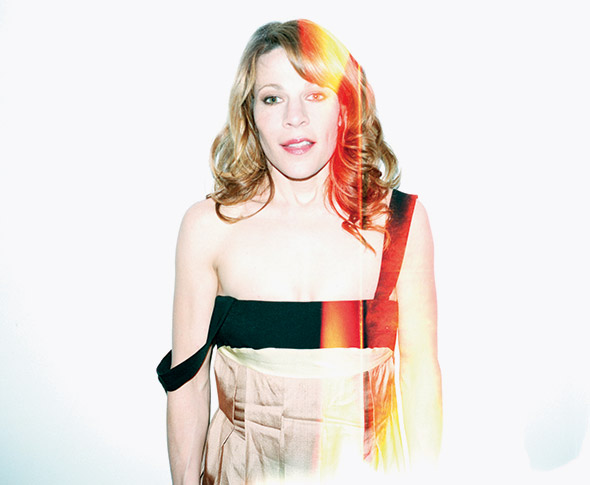
Text by Michelle Lanz
Photography by Jason Nocito
Over the last two decades, Lili Taylor has portrayed a feminist assassin, a deranged kidnapper and a heartbroken teenage songstress, and just shy of her 40th birthday, she has cemented a reputation unparalleled in its boldness by playing subversive characters most actresses wouldn’t dare attempt. As one of the film world’s favorite indie darlings, Taylor has managed to avoid the typical and embrace the unusual, and though she has dabbled in a number of mainstream Hollywood flicks – what young actress wouldn’t jump at the chance to work with Spielberg, after all? – she showcases her true talent and seems most at home with low-budget indies.
Speaking over the phone, Taylor waxes nostalgic for a time when the vision of the director meant more than the depth of his or her pockets. “The best I felt was when the independents were flourishing in the mid- to late ’90s,” she says in a passionate and slightly breathy voice, having just returned from running errands. “We were all working, we were doing what we wanted to do and we weren’t really bothered by financial pressures.”
Standing at a petite 5-feet, 5-inches – and popularly remembered as the heartbroken Corey in Say Anything opposite John Cusack – it’s hard to imagine Taylor playing the role of a kidnapper in Ransom or the crazed assassin in I Shot Andy Warhol, but her tendency toward the bizarre has become her trademark.
With her latest film – Bent Hamer’s Factotum, scheduled for release this month – Taylor continues to confound expectations, playing a disheveled, drunk and disorderly female lead named Jan. Based on the Charles Bukowski novel, the film follows Bukowski’s alter-ego Henry Chinaski (played by Matt Dillon) as he stumbles between menial jobs, women, alcohol and gambling while moonlighting as a writer. In Jan, he finds his most enduring (and flawed) relationship – the pair’s mutual affinity for cheap booze and chain smoking establishes a rocky foundation.
Never wanting to represent the female sex negatively, though, Taylor was wary of the role at first. “Bukowski can be tricky sometimes with women,” she explains. “But when I started reading the script, I realized Jan was a great character. It was a lot more complicated than I thought it would have been.”
Complicated, though, is a serious understatement. Throughout their relationship, the biggest compliment Henry extends toward Jan is that she is “an excellent fuck” with a “tight pussy,” yet Taylor believes Jan and Henry last because of a mutual codependency fueled partly by booze. “I think that the alcohol is one part of it, and also that it’s familiar, comfortable [and] easy. Even though it’s threatening in a way, it’s sort of safe.”
Despite the bleak subject matter and setting, Taylor insists the independent vibe kept the mood light on set. “It was summer [in] Minneapolis and we knew the crew, so it felt really familiar. It was low budget, and even though it was tense because you don’t have money to do this or that and you’re scrambling, by that very thing there’s a connection and a bond.” Her role in Factotum marks her return to independent film after a stint on HBO’s series Six Feet Under and a role in an off-Broadway performance of John Guare’s Landscape of the Body.
When she first started out, Taylor, always a theater actress at heart, decided against making the trek to LA like so many other aspiring actors, and instead moved to New York. “I did live in Los Angeles just to work, but I never moved there. I came here [to New York] because I love doing theater.” Wearing the DIY mentality on her sleeve, she co-founded Machine Full, a downtown New York theater group, with the help of her ex-fiance, Sopranos actor Michael Imperioli. “It’s a theater company that is about supporting my friends’ writing, so if we write something, we put it out.”
Originally from Glencoe, IL, a suburb of Chicago, Taylor is the second-youngest of a family of six kids. Attributing her success as an actress to a supportive household growing up, Taylor describes her upbringing as “artistic, and that there was an encouragement to that. I know with some of my friends growing up who wanted to be artists, their parents didn’t encourage that, which was not the case of my family.”
Taylor insists her calling as an actress was apparent from a really young age. “From about eight-years-old on, I knew that this was what I really wanted to do.” However, reaching the success she enjoys today was anything but effortless. While studying drama at DePaul University, she started to find paid work as an actress but left after one year due to a rule that no drama student may take a paid acting gig while enrolled. “It was hard. It happened so quickly and I didn’t see it coming. My roommates were still going off to school. They had a purpose and I was lost.”
Almost 20 years later, Taylor is anything but lost. Instead, she has established a steady career for herself in an industry known for its broken spirits and unrequited dreams. For Taylor, there’s no right or wrong way to make it in Hollywood or anywhere else for that matter – just a realization that all you can do is “trust that it can be done in all sorts of ways.”

